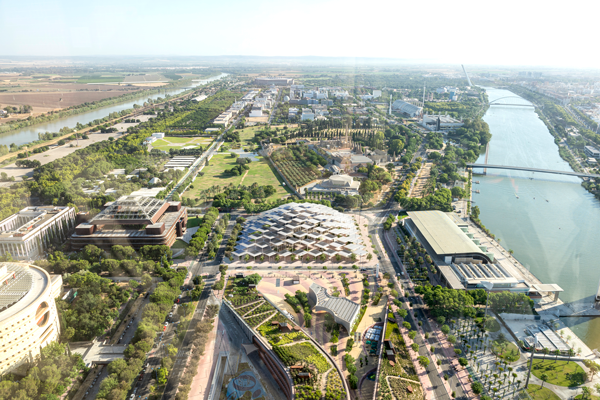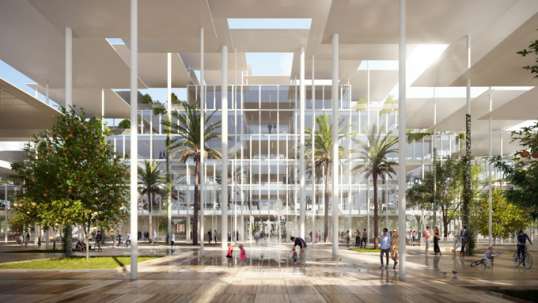
The European Commission today awarded first prize to Bjarke Ingels Group, BIG in an international architectural competition to choose a concept design for the future permanent site of the Commission’s Joint Research Centre site in Seville (Spain).
The BIG proposal will cover the entire JRC site with a cloud of solar canopies, sheltering the plaza, garden, and research building underneath, just like the ‘pergolas’ – shaded passageways – that are typical in Seville. The canopies consist of square lightweight photovoltaic sheets, supported by a forest of slender columns. The roofscape will cascade down from the centre of the site to head height at its periphery, creating a variety of public spaces underneath.
Announcing the winner, JRC Director-General Stephen Quest said: “We are extremely excited to announce this incredible design for the new JRC site in Seville, as we launch the New European Bauhaus Lab. The ‘NEB Lab’ aims to create enabling conditions for the green transition and drive tangible transformation on the ground. The new building for the JRC Seville site is the ideal opportunity for us to ‘walk the talk’. The future building will be one of the first examples of architecture entirely inspired by the values of the New European Bauhaus of sustainability, aesthetics and inclusion”.
Bjarke Ingels, BIG studio founder, said: “With our design for the Joint Research Centre in Sevilla we have attempted to allow the sustainable performance of the building to drive an architectural aesthetic that not only makes the building perform better but also makes it more inhabitable and more beautiful”.
Inspired by the architectural vernacular of the southern Spanish city, BIG’s design proposal delivers on the JRC’s commitment to sustainability, unites the European vision of the New European Bauhaus initiative, and establishes a new benchmark for workspace that empowers collaboration and co-creation and is adaptable to the JRC’s future needs.
The European Commission will now negotiate a contract with BIG to draft a full project proposal. The final decision on the project will then be taken by the European Commission and — ultimately — by the budgetary authority of the European Union (including the European Parliament and the Council of the EU). In the event of a positive success of the decision-making process, construction works could tentatively start in 2024.
New European Bauhaus and a new benchmark for workspace
The JRC site will host public and private outdoor spaces and will house over 400 international scientific and support staff. Their work focuses on socio-economic and technological support to key European policies, such as the European Green Deal, digital transformation and an economy fit for all.
Located at the former EXPO ´92 Seville site, in Isla de la Cartuja, the new building ties into the City of Seville’s goal to become a global benchmark for sustainability by 2025 and the local vision to decarbonise and transition Isla de la Cartuja to 100% renewable energy.
Prizes and Honourable mentions
The Jury of the Contest, made up of leading architects from all over Europe, the International Union of Architects (UIA), Seville City Hall and European Commission representatives, selected two additional prizes and three honourable mentions.
Danish architect Dorte Mandrup’s design was awarded the second prize, while a proposal from architectural firm Cobe received the third prize.
The projects awarded with an “honourable mention” where from ALA Oy, Mecanoo, and Muoto studio.
Contest background
This international design competition kicked off in 2021. It has been carried out in accordance with the UNESCO “Standard Regulations for International Competitions in Architecture and Town-Planning” and was endorsed by the International Union of Architects and the Architects’ Council of Europe. 65 among the best architectural firms in Europe and beyond accepted the challenge and 15 teams were selected and invited to develop proposals.
The Contest Jury, composed predominantly of internationally recognised architects (including a member indicated by the Seville City Council), evaluated the proposals received against the criteria set out in the procurement procedure: JRC/SVQ/2021/DC/0327 New JRC Building in Seville International architectural design contest.
All proposals remained anonymous during the entire evaluation phase, until after the jury’s unanimous decision on the prize winners.
A Technical Committee also assisted the Jury to assure compliance in formal and technical aspects such as sustainability, urban planning, landscape architecture, workspace design, and cost estimate.
Related content
Details
- Publication date
- 7 April 2022
- Author
- Joint Research Centre

